Mother of Christ . . .
Home Page
Mary
Introduction
Mary's Litany
Historically, men have recognized the existence of a
higher power above themselves and nature. Over time, this being
identified himself and his plan to draw everyone toward himself. Certain
persons who heard and announced God's messages were called prophets.
These ordinary men were called by God to give directions for right actions to
his chosen people and those who heard his voice to recognize future signs which
would point toward God's favored, God's chosen one, who would release men from their
bondage to sin, and open their way to heaven. All prophecies described
one person who was called the "Prince of Peace, Wonder Counselor, The King
of Kings and Lord of Lords." This would characterize the "
The name Christ means, "Anointed One." Historically, the religious leader, acting as the representative or ambassador of divinity, officially recognized the legitimacy of kings to exercise their power to rule the people as God's representative as when the prophet Samuel anointed David king to follow Saul. Today, the rite of anointing is performed in the Sacraments of Baptism, Confirmation, and Holy Orders. The individual is anointed with chrism which marks him as one set apart as priest, as prophet, and king. During ordination to the priesthood, the candidate's hands are anointed. Through them we receive the divinity of the body and blood of Jesus Christ.
Christ is the Anointed One of God. The word signifies his mission as God's Son to redeem us by satisfying for the sin of pride by our first parents. By his suffering and death on the cross, God's anointed opened for us the door of opportunity to gain heaven.
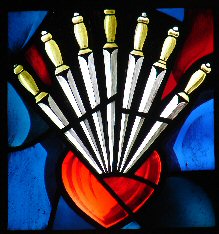 In imitation of Jesus, a Christian
should love Mary, and think the best of her. He should have her for
mother, and as such love her, serve her, wait upon her, and, like Jesus, be
totally subject to her. (1)
In imitation of Jesus, a Christian
should love Mary, and think the best of her. He should have her for
mother, and as such love her, serve her, wait upon her, and, like Jesus, be
totally subject to her. (1)
Jesus is the mediator of justice who can ask in his own name, and in consideration of his own merits and his own rights. Mary herself obtains what she asks only through the merits of the savior, and in virtue of prayer made in the name of Jesus Christ. (2) St. Bernard of Clairvaux
What Jesus meant when he said,
"Behold your mother, was this: My wounds are sources of graces, which flow
only through Mary.
(3) St. Andrea
Mary is truly our mother; not indeed
physically but spiritually, of our souls and of our salvation. For she,
by giving us Jesus, gave us true life; and afterwards, by offering the life of
her Son on
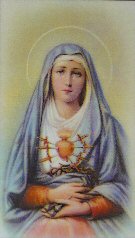 St. Simeon in the temple received a
promise from God that he should not die until he had seen the Messiah.
But this grace he received through Mary, for it was in her arms that he found
the savior. Therefore, he who desires to find Jesus,
will not find him otherwise than through
Mary. (5) St. Alphonsus Liguori
St. Simeon in the temple received a
promise from God that he should not die until he had seen the Messiah.
But this grace he received through Mary, for it was in her arms that he found
the savior. Therefore, he who desires to find Jesus,
will not find him otherwise than through
Mary. (5) St. Alphonsus Liguori
Let those who think that the Church
pays too much attention to
The reason why Christ is unknown
today is because His Mother is unknown.
If it is impossible to separate what
God has united, it is also certain that you cannot find Jesus except with Mary
and through Mary. (8)
St. Pius X, pope
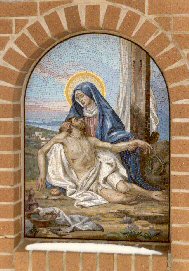 The virgin was kept immune from all
stain of original sin because she was to be the Mother of Christ, and she was
the Mother of Christ that the hope of everlasting happiness might be born again
in our souls. (9)
St. Pius X, pope
The virgin was kept immune from all
stain of original sin because she was to be the Mother of Christ, and she was
the Mother of Christ that the hope of everlasting happiness might be born again
in our souls. (9)
St. Pius X, pope
The
Child is not found without Mary, His Mother . . . If, then, it is impossible to
separate what God has united, it is also certain that you cannot find Jesus
except with Mary and through Mary.
(10) Leo XIII, pope
It was on Calvary
that Christ, Mary's most blessed Son and our brother, gave her to us as our
mother, when he said to St. John: "Behold your mother."
(11) St. Josemaria Escriva
 The blessed
Virgin embraced us in her suffering, as the ancient prophecy was fulfilled: "And
a sword shall pierce your own soul" (Luke 2:35). We are all her children,
she is the Mother of all mankind.
(12) St. Josemaria Escriva
The blessed
Virgin embraced us in her suffering, as the ancient prophecy was fulfilled: "And
a sword shall pierce your own soul" (Luke 2:35). We are all her children,
she is the Mother of all mankind.
(12) St. Josemaria Escriva
In fact, the
august Virgin, conceived without original sin, was chosen to be the Mother of
Christ in order to be associated with him in the redemption of mankind.
For that reason she was adorned with such abundant grace and such great power in
her Son's sight that neither human nor angelic nature can ever acquire a like
grace of power.
(13) Pius XI, pope
If it is
impossible to separate what God has united, it is also certain that you cannot
find Jesus except with Mary and through Mary.
(14) St. Pius X, pope
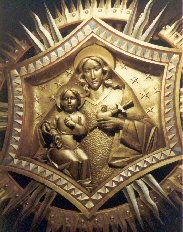 Mary suffered
and, as it were, nearly died with her suffering Son; for the salvation of
mankind she renounced her mother's rights and, as far as it depended on her,
offered her Son to placate divine justice; so we may well say that she with
Christ redeemed mankind. (15) Benedict XV, pope
Mary suffered
and, as it were, nearly died with her suffering Son; for the salvation of
mankind she renounced her mother's rights and, as far as it depended on her,
offered her Son to placate divine justice; so we may well say that she with
Christ redeemed mankind. (15) Benedict XV, pope
Mother most
faithful and most merciful, who as co-Redemptrix and partaker of your son's
sorrow, assisted him as he offered the sacrifice of our redemption on the altar
of the Cross.
(16) Pius XI, pope
To mankind
heading for eternal ruin, she offered a Savior when she received the
announcement of the mystery brought to this earth by the angel, and in giving
her consent, gave it in the name of the whole human race.
(17) Leo XIII, pope
In a miracle of
love, so that she might receive us as her sons, Mary offered generously to the
divine justice her own Son, and in her heart died with him, stabbed by the sword
of sorrow.
(18) Leo XIII, pope
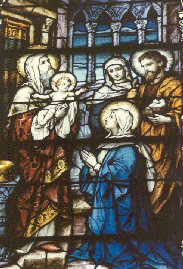 It was not only
the glory of the Mother of God to have presented to God the only begotten who
was to be born of human members, the material by which he was prepared as a
Victim for the salvation of mankind, but hers also the office of tending and
nourishing that Victim, and at the appointed time of offering him at the altar.
(19) St. Pius X, pope
It was not only
the glory of the Mother of God to have presented to God the only begotten who
was to be born of human members, the material by which he was prepared as a
Victim for the salvation of mankind, but hers also the office of tending and
nourishing that Victim, and at the appointed time of offering him at the altar.
(19) St. Pius X, pope
The Virgin was
kept immune from all stain of original sin because she was to be Mother of
Christ, and she was the Mother of Christ that the hope of everlasting happiness
might be born again in our souls.
(20) St. Pius X, pope
By the will of
God, the most Blessed Virgin Mary was inseparably joined with Christ in
accomplishing the work of man's redemption, so that our salvation flows from the
love of Jesus Christ and his sufferings intimately united with the love and
sorrows of his Mother. (21) Pius XII, pope
The most pure
heart of Mary was seat of that love, of that sorrow, of those most sublime
affections which had so great a part in our redemption, especially when she kept
vigil at the foot of the Cross.
(22) Pius XII, pope
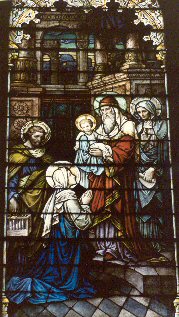 She stood at the
foot of the Cross and offered those sorrows to the Eternal Father for our
salvation.
She stood at the
foot of the Cross and offered those sorrows to the Eternal Father for our
salvation.
(23) Pius VII, pope
She it was, who,
always most closely united with her Son, offered him up to the Eternal Father on
Calvary, along with the sacrifice of her own claims as his Mother and of her own
mother love.
(24) Pius XII, pope
After witnessing
at the foot of the Cross the awful spectacle of the Passion of Our Lord, in
which she had offered the most difficult sacrifice that could be asked of a
mother, she continued to lavish her maternal care upon the first Christian
adopted children.
(25) Pius XII, pope
The grace of
Christ comes to us through the Mother of Christ. She . . . became at the
same time Mother of Christ and Mother of Divine Grace. The maternal office of
Mediatrix really began at the very moment of her consent
to the Incarnation.
(26) Pius XII, pope
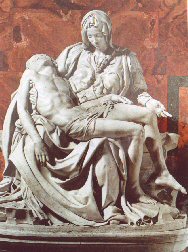 She is associated
with him for ever, with power so to speak infinite, in the distribution of the
graces which flow from redemption.
(27) Pius XI, pope
She is associated
with him for ever, with power so to speak infinite, in the distribution of the
graces which flow from redemption.
(27) Pius XI, pope
She has her royal
power to distribute the treasures of the kingdom of the divine Redeemer.
(28) Pius XII, pope
She never ceases
to bestow all the treasures of her affection and loving attention upon humanity
so much in need of compassion.
(29) Pius XII, pope
It has been
allowed to the august Virgin to be the most powerful Mediatrix and advocate of
the whole world with her divine Son.
(30) St. Pius X, pope
 The use of the sacred names of Jesus and Mary, as a short prayer is sweet to the
mind, and powerful. It will protect those who use it against the enemies
of their salvation. (31) Thomas àKempis
The use of the sacred names of Jesus and Mary, as a short prayer is sweet to the
mind, and powerful. It will protect those who use it against the enemies
of their salvation. (31) Thomas àKempis
We
can imagine how in various situations the Virgin must have pondered on those
words of the Angel: "Do not fear, Mary." She must have heard them again when
Simeon said to her: "This child is destined to be the downfall and the rise of
many in Israel, a sign that will be opposed - and you yourself will be pierced
with a sword," at that very moment in which she might have succumbed to fear,
Mary returned to the Angel's words and felt their echo within her; "Do not fear,
God is carrying you." Then, when contradictions were unleashed against
Jesus during his public life and many said, "He is crazy," she thought once
again of the Angel's words in her heart, "Do not fear," and went ahead.
Lastly, in the encounter on the way to Calvary and then under the Cross, when
all seemed to be destroyed, she again heard the Angel's words in her heart: "Do
not fear. She stood courageously beside her dying Son and, sustained by
faith, moved towards the Resurrection, towards Pentecost, towards the foundation
of the new family of the Church. (32) Benedict XVI, pope
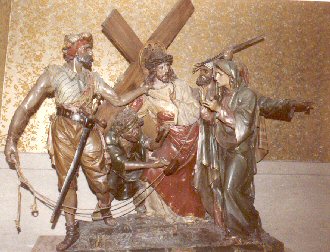 The
Virgin Mary herself, among all human creatures the closest to God, still had to
walk day after day in a pilgrimage of faith, constantly guarding and meditating
on in her heart the Word that God addressed to her through Holy Scripture and
through the events of the life of her Son, in whom she recognized and welcomed
the Lord's mysterious voice. (33) Benedict XVI, pope
The
Virgin Mary herself, among all human creatures the closest to God, still had to
walk day after day in a pilgrimage of faith, constantly guarding and meditating
on in her heart the Word that God addressed to her through Holy Scripture and
through the events of the life of her Son, in whom she recognized and welcomed
the Lord's mysterious voice. (33) Benedict XVI, pope
One must remain in prayer with Mary, the Mother given to us by Christ from the Cross. (34) Benedict XVI, pope
Mary, who by a mysterious plan was associated to the sufferings of Christ her Son, never tires to exhort us to live and share with serene trust the experience of sorrow and sickness, offering it with faith to the Father, thus completing in our flesh what is lacking in the sufferings of Christ. (35) Benedict XVI, pope
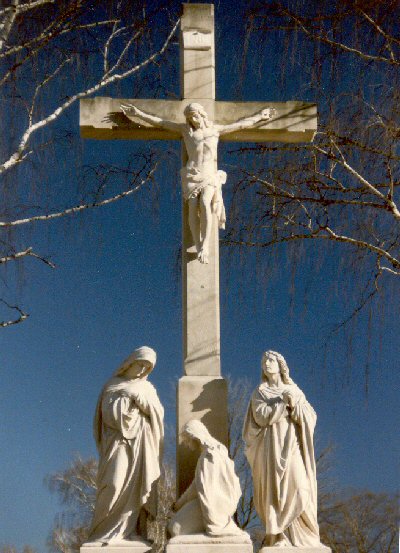 The
archetype for the second coming of Christ, which we might call a "spiritual
incarnation," is always Mary. Just as the Virgin Mother pondered in her
heart on the Word made flesh, so every individual soul and the entire Church are
called during their earthly pilgrimage to wait for Christ who comes and to
welcome him with faith and love ever new.
(36) Benedict XVI, pope
The
archetype for the second coming of Christ, which we might call a "spiritual
incarnation," is always Mary. Just as the Virgin Mother pondered in her
heart on the Word made flesh, so every individual soul and the entire Church are
called during their earthly pilgrimage to wait for Christ who comes and to
welcome him with faith and love ever new.
(36) Benedict XVI, pope
In
her immaculate soul, Mary herself was to be pierced by the sword of sorrow, thus
showing that her role in the history of salvation did not end in the mystery of
the Incarnation but was completed in loving and sorrowful participation in the
death and Resurrection of her Son. (37) Benedict XVI, pope
The
loneliness of Mary. Alone! She weeps, forsakenly. You and I
should keep Our Lady company, and weep also: for Jesus has been fastened to the
wood, with nails, our miseries. (38) St. Josemaria Escrivá
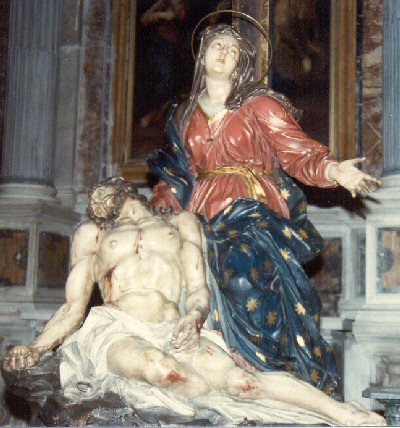 The
humility of my Mother Holy Mary! You won't see her amid the palms of
Jerusalem, nor, apart from the first-fruits of Cana, at the hour of the great
miracles. But she doesn't flee from the contempt of Golgotha: there,
iuxta crucem Jesu, beside the cross of Jesus, stands his Mother. (39) St. Josemaria Escrivá
The
humility of my Mother Holy Mary! You won't see her amid the palms of
Jerusalem, nor, apart from the first-fruits of Cana, at the hour of the great
miracles. But she doesn't flee from the contempt of Golgotha: there,
iuxta crucem Jesu, beside the cross of Jesus, stands his Mother. (39) St. Josemaria Escrivá
Mary points to
Jesus. She asks us to bear witness to Jesus, she constantly guides us to
her Son Jesus, because in Him alone do we find salvation. He alone can
change the water of our loneliness, difficulties and sin into the wine of
encounter, joy and forgiveness. He alone. (40) Francis I, pope
Deep inside herself Our Lacy, with great simplicity, listened and mediated on the Word of God and on that which happened to Jesus. She followed her Son with intimate conviction, with firm hope. (41) Francis I, pope
Home Page
Mary
Introduction
Mary's Litany